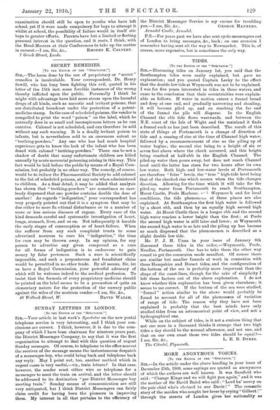PUBLIC-SCHOOL EDUCATION.
[To THE EDITOR 07 TEE " SPECTATOR."] Sin,—I have been much interested in your article on the important resolution moved by Dr. Gray at the recent Head- Masters' Conference. Another question of wide importance was also raised thereat to which I should like to draw attention.
The training given at public schools is twofold, and an important part in the development of a boy's character is gained in the playing-fields, where qualities are acquired which have great weight in after life. But that side of education should not be allowed to interfere with the training which can be given only within the walls of the schools. In this age of stress, when not only every profession, but also nearly every business, requires some preliminary test of general education to be passed, it is desirable that a much larger proportion of public-school boys should qualify before ending their school career.
This leads to a wider question which was apparently touched upon at the Conference. At present nearly every profession or business has its own particular entrance examination, which, with the special books required to be read therefor, interferes with the broad general education which should bo given in the schools. When a boy's future work is decided upon during his school career, it is naturally desired that he be prepared for the particular examination, with the result that he is 'working by himself in a corner of the school, to the detriment of the general school course.
If a general leaving examination could be agreed upon (divided into several grades) which should be the passport to the Universities, professions, and businesses, much waste of time, energy, and expense would be saved. It should then be open to the various governing bodies of the different pro- fessions and trades to specify, where necessary, any particular subject of general education in which examination was needed, and to accept the grade which satisfied their requirements. It seems to me that the schools have the right to the control of the examination which should necessarily follow school education, and which should form the preliminary to the next or specialised stage of instruction. The governing bodies of the next stage, whether they be connected with medicine, law, engineering, or any other trade or profession, keep the control of the examination of fitness following upon the course of instruction they prescribe, and schools, in my opinion, ought to adopt the same course.
One objection to such a change in our educational system would be the possible interference with vested interests. At present one or more professions encourage higher education by exempting from their particular entrance examination persons who have passed an examination of a higher degree, and in some cases by shortening in consequence the subse- quent service required before the student becomes a member of the profession. But although such advantages, which add to the status of the profession, are gained at greater cost to the individual, the student before admittance is penalised by having to pay the fee in respect of the examination which he was relieved from undergoing.
If all these special entrance examinations, for which the various governing bodies for the most part have not any special qualification, were swept away, and the examination on general education prior to specialisation were left to a joint Board, the result would be a distinct gain for education, and a large reduction of time and expense which is at present wasted. It would also be a great advantage in many cases to the boys themselves, inasmuch as the passing of such an examination before leaving school would widen immeasurably the openings which would be available for them afterwards without further qualification. In existing circumstances the further qualification required in very many cases after a boy has left school (with the consequent preparation therefor) often limits his choice of a trade or profession.
In Germany I believe a real advantage is gained by a boy who passes well his school examination, and it should not be difficult in this country to offer some similar inducement which would encourage boys in their studies. Although the
examination should still be open to youths who have left school, yet if it were made compulsory for boys to attempt it whilst at school, the possibility of failure would in itself stir boys to greater efforts. Parents have but a limited or fleeting personal interest in the question, and it rests, I think, with the Head-Masters at their Conferences to take up the matter







































 Previous page
Previous page